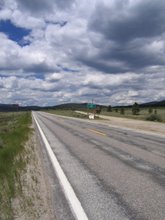The theme for today is justice. Talking about justice in church has always made me uncomfortable— I have some pretty strong political positions, which I think are closely connected to my faith, yet I know equally well-meaning people have differing positions. Unfortunately, the nature of the sermon (or here, a reflection) is not conversational, and there’s always the danger of using religion to end the conversation rather than to begin it.
My unease is unfortunate, because I think Jesus and the Christian tradition have a lot to say about justice and how we organize society. There’s a big movement afoot to “spiritualize” Jesus’ sayings, claiming that Jesus’ talk about coming of the “kingdom of God” applies only to the spirit (or only to the future). This moves far from the meaning that Jesus’ listeners and the readers of the gospel would have heard. When Jesus reads from the scroll of Isaiah, “God has sent me to proclaim release to the captives, and recovery of sight to the blind, to let the oppressed go free,” he is not speaking of a salvation that will get them into heaven—he is talking about a change in the physical, social-economic-political reality.
You needn’t worry that I’ll launch off into Jesus’ 10 point plan for the next Presidential administration. Suffice it to say that there is plenty there in the gospels that makes claims on the kind of government we should have, though it’s pretty hard to figure it all out.
Yet if it is a mistake to think that Jesus has nothing to say about government, it is also a mistake to think that justice is only about what the government should do. Justice is built, not just legislated, and the Jesus movement lived out a radical justice.
The simple act of sharing a meal together, a tradition we will continue today, signified the unity of the body of Christ, and allowed Paul to proclaim:
“There is no longer Jew or Greek, there is no longer slave or free, there is no longer male and female; for all of you are one in Christ Jesus “
I’ve grown up hearing these words so often that they seem trite. But consider: In the passage we just read, the crowd at Nazareth goes to throw Jesus off the cliff not because he was claiming that the words of Isaiah were coming true. The crowd was filled with rage because Jesus asserts the universality of the gospel—highlighting stories in the past in which the Jewish prophets went to Gentiles, and asserting it might happen again.
Focusing on the government as the only locus of justice can lead us to ignore how we can work for justice in our own lives. Participation in democracy is empowering, because we get to make claims on what kind of justice we want to see; yet it can seem disempowering too, because if we lose with 49% of the vote we can be tempted to inaction.
I’ve been reading about the history of the underground railroad in the United States. In the face of the abolitionist movement’s repeated legislative failure, seemingly “normal” people engaged in risky heroic actions. Free-blacks, Congregationalists and Quakers, and many others sheltered runaway slaves despite the danger of violent reprisals and legal sanctions under the Fugitive Slave Act, which made it a federal crime to assist a runaway slave.
This example highlights the value of our community’s justice work. We may not be running an underground railroad at First Church, but we are running a Monday Supper for the community, volunteering at a domestic violence shelter, contributing to the wider church’s ministries through our OCWM offering, taking trips to the orphanage, working for same-sex marriage. Individually, we engage in numerous other justice ministries.
Sometimes, when I think about the kind of justice work we can do as individuals or as a church, everything seems too small to matter. But our actions add up, just as the actions of abolitionists helped add up to over 30,000 escaped slaves. This should both encourage and inspire us, to search for where God is calling us to work justice in our lives.

No comments:
Post a Comment